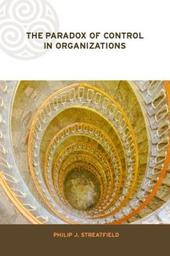
|
The Paradox of Control in Organizations
Paperback
Main Details
| Title |
The Paradox of Control in Organizations
|
| Authors and Contributors |
By (author) Philip Streatfield
|
| Series | Complexity and Emergence in Organizations |
|---|
| Physical Properties |
| Format:Paperback | | Pages:176 | | Dimensions(mm): Height 234,Width 156 |
|
| Category/Genre | Organizational theory and behaviour |
|---|
| ISBN/Barcode |
9780415250320
|
| Classifications | Dewey:658.4013 |
|---|
| Audience | | Undergraduate | | Postgraduate, Research & Scholarly | | Professional & Vocational | |
|---|
|
Publishing Details |
| Publisher |
Taylor & Francis Ltd
|
| Imprint |
Routledge
|
| Publication Date |
30 August 2001 |
| Publication Country |
United Kingdom
|
Description
Business leaders are expected to be "in control" of the situation in which their businesses find themselves. But how can organizational leaders and managers control matters entirely out of their hands; such as the next action a competitor takes, or the next law a government may pass? In this book, Philip Streatfield reflects on his own experiences as a manager to explore the question of who, or what is "in control" in an organization. Adopting the perspective of complex responsive processes developed in the first two volumes of this series, the author takes self-organization and emergence as central themes in thinking about life in organizations. He focuses on the tension between spontaneously forming patterns of conversation, and intentional actions, arguing that the order of organizations emerges through a combination of collective interaction and individual intentions. The argument is developed by considering the day-to-day experiences of life in a large pharmaceutical organization.
Author Biography
Philip Streatfield is Supply Chain Director at Entertainment UK. Before taking up this position he was Global Logistic Director at SmithKline Beecham where he had responsibility for managing significant organizational change.
Reviews'Valuable insights from a practising manager who can reflect on his experience within a framework of academic rigour. A rare and remarkable study.' - Long Range Planning
|